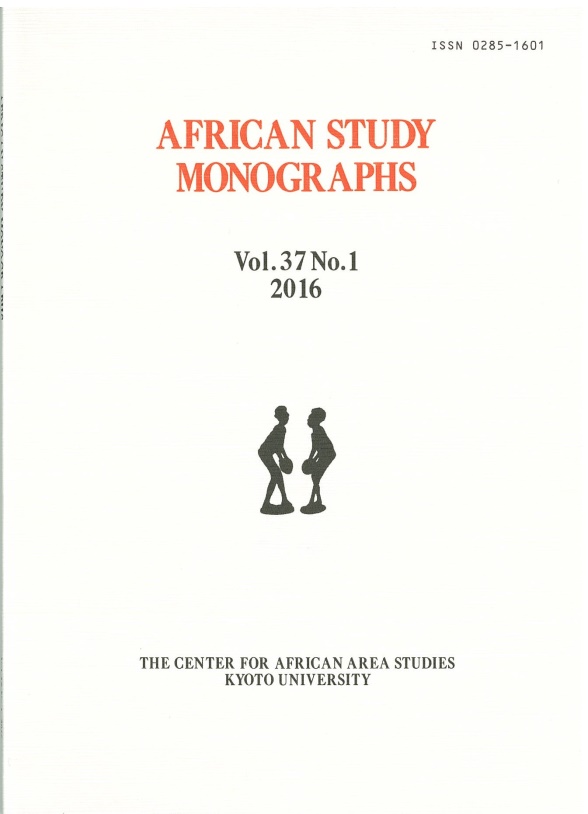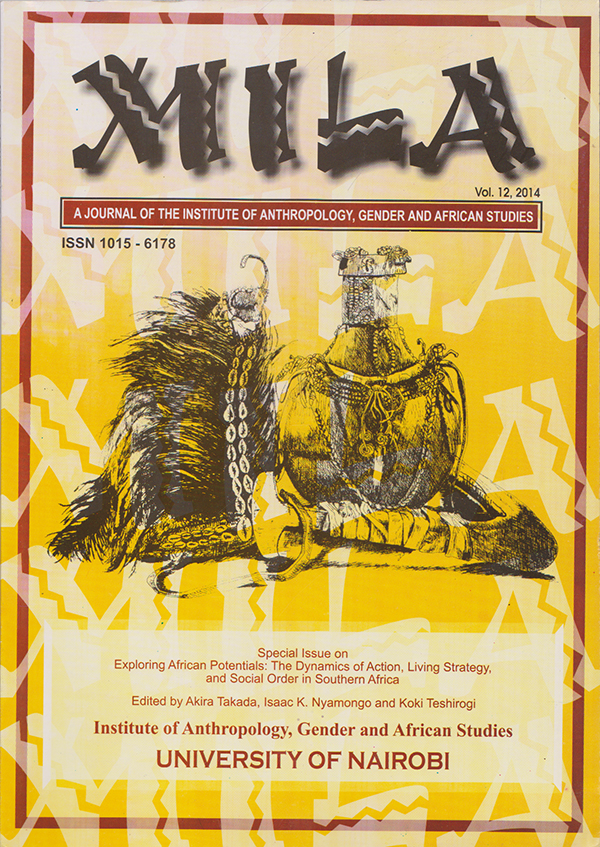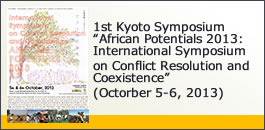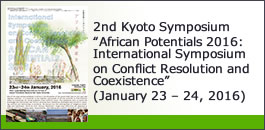[10th Meeting of Research Cluster on West Africa / 21st Public Workshop / 11th Meeting of Research Unit on Politics and International Relations] “Informalization and Its Discontents & Violent Islamic Radicalization” (Co- organized by the 29th Kyoto University African Studies Seminar (KUASS)) (November 21, 2014)
Date: November 21, 2014. 14:00-17:00
Venue: Middle-sized seminar room, 3F Inamori Center, Kyoto University
Program
Prof Abdul Raufu Mustapha (Oxford University)
Violent Islamic Radicalization:Northern Nigeria in the light of the experience of southern Niger Republic
Kate Meagher (London School of Economics)
Informalization and Its Discontents: The Informal Economy and Islamic Radicalization in Northern Nigeria
Abstract
Mustapha, A. Raufu
Violent Islamic Radicalization: Northern Nigeria in the light of the experience of southern Niger Republic
At first glance, northern Nigeria and southern Niger Republic share a number of important religious, economic, and social characteristics.
- Both belong to the sahelian cultural belt just south of the Sahara, running from Senegal to Somalia; a zone in which Islam has exercised significant influence for over a thousand years.
- The two regions are also united by the prevalence the Hausa language.
- Both are regrettably regions of high levels of poverty and depressed socio-economic indicators.
- Finally, they both share a complex admixture of sectarian communities of Sufi Brotherhoods and reformist strands of Islam.
Since the early 19th century, religious and political ideas, religious groups, economic actors, and political forces have moved back and forth across the boundary between both regions. In the process, events in one region have tended to have ramifications for developments in the other. For instance, the Sokoto jihad of 1804 spread Qadiriyya Brotherhood influence to the territories that are now in Niger Republic and many ‘of the wealthiest merchants of Niger belong to this order, whose members are referred to locally as ‘yan sadalu’. Similarly, the Tijaniyya-Ibrahimiyya Brotherhood was spread from Kano to Niger in the 1950s and its members are known locally as the ‘yan kabalu’. Significantly, the Qadiriyya-Tijaniyya conflicts which racked Nigeria in the 1950s and 1960s also took place in Niger. In the same vein, the reformist Salafist Nigerian sect, Izala, also made an appearance in Niger Republic in the 1980s, having been formed in Nigeria. As in Nigeria, the appearance of this reformist Salafist sect generated high levels of religious discord with the established Sufis in Niger. And as happened in Nigeria, Izala also broke into two main factions.
Though the flow and ebb of ideas and people go in both directions, there is the recognition of Nigeria’s formidable cultural, religious, and economic influence on Niger. This is captured in the Nigerien saying: ‘When Nigeria has a cold, Niger coughs’.
Since 2009, northern Nigeria has been battling a stubborn Islamist insurgency spear-headed by the Boko Haram. Analysts have been speculating on the possible consequence of this insurgency for Niger Republic, given the shared characteristics between both regions. Why has there not been the development of a similar insurgency in Niger? This lecture reflects on this question. The lecture compares the drivers of possible radicalization in both regions, looking specifically at: (a) the variable cultural geographies of within and between the two region; (b) impact of historical forces; (c) the importance of economic processes; (d) the political and administrative dynamics in both regions; and (e) religious factors, especially the place of Christianity in both regions and the prevalence of some religious ideas such as secularism. Through such a comparison, it should become clearer why, despite their seeming similarities, violent Islamist radicalization remains dormant in southern Niger but active in northern Nigeria.
Meagher, K.M.B. Kelly (London School of Economics)
Informalization and Its Discontents: The Informal Economy and Islamic Radicalization in Northern Nigeria
This seminar explores the dark side of inclusive markets in the context of northern Nigeria. It examines how strategies of economic inclusion generate new dynamics of exclusion through processes of selective inclusion and marginalization. Despite the celebrated resurgence of the Nigerian economy, the majority of the population has remained trapped in the realities of jobless growth, rising poverty and expanding economic informality. The interface of historical disadvantage, economic reforms, and the dynamics of the global economy have exacerbated problems of regional inequality within Nigeria, concentrating the benefits of inclusive markets in the south and the negative side-effects in the northern region of the country, fostering escalating poverty, disaffection and Islamic extremism.
Drawing on fieldwork conducted in the northern Nigerian cities of Kano and Kaduna in 2014, I will explore the nature and limitations of inclusive economies within the context of northern Nigeria’s vibrant informal economy. I will focus on how inclusive economies have exacerbated economic stress within northern Nigeria, and generated new and increasingly problematic processes of exclusion. Based on interviews with operators and associational leaders in a selection of eight common informal production and service activities, I show how mounting economic pressures are restructuring patterns of ownership, social identity, educational attainment and religious affiliation within the informal economy. Indigenous institutions and networks of religious tolerance and economic interdependence are being eroded by new patterns of competition over access to informal jobs based on education and identity. Popular disaffection is heightened by human rights abuses by security forces and graduate employment programmes, which further marginalize poor and less-educated informal actors, exacerbating economic stress and resentment against the state, and creating a tinderbox for violence and Islamic extremism.
[9th Meeting of Research Cluster on West Africa / 10th Meeting of Research Unit on Politics and International Relations] “Islamic Radicalization in Nigeria” (November 19, 2014)
Date: November 19, 2015. 16:00 – 18:00
Venue: Collaboration room 1 on the 4th floor, Building 18, Komaba
Campus, The University of Tokyo
Program
Prof Abdul Raufu Mustapha (Oxford University)
Violent Islamic Radicalization:Northern Nigeria in the light of the experience of southern Niger Republic
Informalization and Its Discontents: The Informal Economy and Islamic Radicalization in Northern Nigeria
Abstract
Mustapha, A. Raufu
Violent Islamic Radicalization: Northern Nigeria in the light of the experience of southern Niger Republic
At first glance, northern Nigeria and southern Niger Republic share a number of important religious, economic, and social characteristics.
- Both belong to the sahelian cultural belt just south of the Sahara, running from Senegal to Somalia; a zone in which Islam has exercised significant influence for over a thousand years.
- The two regions are also united by the prevalence the Hausa language.
- Both are regrettably regions of high levels of poverty and depressed socio-economic indicators.
- Finally, they both share a complex admixture of sectarian communities of Sufi Brotherhoods and reformist strands of Islam.
Since the early 19th century, religious and political ideas, religious groups, economic actors, and political forces have moved back and forth across the boundary between both regions. In the process, events in one region have tended to have ramifications for developments in the other. For instance, the Sokoto jihad of 1804 spread Qadiriyya Brotherhood influence to the territories that are now in Niger Republic and many ‘of the wealthiest merchants of Niger belong to this order, whose members are referred to locally as ‘yan sadalu’. Similarly, the Tijaniyya-Ibrahimiyya Brotherhood was spread from Kano to Niger in the 1950s and its members are known locally as the ‘yan kabalu’. Significantly, the Qadiriyya-Tijaniyya conflicts which racked Nigeria in the 1950s and 1960s also took place in Niger. In the same vein, the reformist Salafist Nigerian sect, Izala, also made an appearance in Niger Republic in the 1980s, having been formed in Nigeria. As in Nigeria, the appearance of this reformist Salafist sect generated high levels of religious discord with the established Sufis in Niger. And as happened in Nigeria, Izala also broke into two main factions.
Though the flow and ebb of ideas and people go in both directions, there is the recognition of Nigeria’s formidable cultural, religious, and economic influence on Niger. This is captured in the Nigerien saying: ‘When Nigeria has a cold, Niger coughs’.
Since 2009, northern Nigeria has been battling a stubborn Islamist insurgency spear-headed by the Boko Haram. Analysts have been speculating on the possible consequence of this insurgency for Niger Republic, given the shared characteristics between both regions. Why has there not been the development of a similar insurgency in Niger? This lecture reflects on this question. The lecture compares the drivers of possible radicalization in both regions, looking specifically at: (a) the variable cultural geographies of within and between the two region; (b) impact of historical forces; (c) the importance of economic processes; (d) the political and administrative dynamics in both regions; and (e) religious factors, especially the place of Christianity in both regions and the prevalence of some religious ideas such as secularism. Through such a comparison, it should become clearer why, despite their seeming similarities, violent Islamist radicalization remains dormant in southern Niger but active in northern Nigeria.
Meagher, K.M.B. Kelly (London School of Economics)
Informalization and Its Discontents: The Informal Economy and Islamic Radicalization in Northern Nigeria
This seminar explores the dark side of inclusive markets in the context of northern Nigeria. It examines how strategies of economic inclusion generate new dynamics of exclusion through processes of selective inclusion and marginalization. Despite the celebrated resurgence of the Nigerian economy, the majority of the population has remained trapped in the realities of jobless growth, rising poverty and expanding economic informality. The interface of historical disadvantage, economic reforms, and the dynamics of the global economy have exacerbated problems of regional inequality within Nigeria, concentrating the benefits of inclusive markets in the south and the negative side-effects in the northern region of the country, fostering escalating poverty, disaffection and Islamic extremism.
Drawing on fieldwork conducted in the northern Nigerian cities of Kano and Kaduna in 2014, I will explore the nature and limitations of inclusive economies within the context of northern Nigeria’s vibrant informal economy. I will focus on how inclusive economies have exacerbated economic stress within northern Nigeria, and generated new and increasingly problematic processes of exclusion. Based on interviews with operators and associational leaders in a selection of eight common informal production and service activities, I show how mounting economic pressures are restructuring patterns of ownership, social identity, educational attainment and religious affiliation within the informal economy. Indigenous institutions and networks of religious tolerance and economic interdependence are being eroded by new patterns of competition over access to informal jobs based on education and identity. Popular disaffection is heightened by human rights abuses by security forces and graduate employment programmes, which further marginalize poor and less-educated informal actors, exacerbating economic stress and resentment against the state, and creating a tinderbox for violence and Islamic extremism.
[7th Meeting of West Africa Research Cluster / 18th Public Workshop] Prof. Murray Last “The Dilemma in Being an Islamic Radical in Northern Nigeria: Whether Non-violent or Violent” (Co-hosted with 24th Kyoto University African Studies Seminar (KUASS), May 20, 2014)
Date: May 20, 2014 15:00-17:00
Venue: Room #318, Inamori Foundation Memorial Bldg. (Inamori Center), Kyoto University
Program
Title: The Dilemma in Being an Islamic Radical in Northern Nigeria: Whether Non-violent or Violent
Speaker: Prof. Murray Last (University of London, Professor emeritus)
Abstract
PDF>>[1st Meeting of West Africa Research Cluster / 5th Public Workshop] (February 15, 2012)
Date: February 15, 2012
Venue: Inamori Foundation Memorial Bldg. (Inamori Center), Middle-sized Meeting Room, Kyoto University
Program
“Nigeria: The Post-Amnesty Blues and the Future of Insurgency in the Niger Delta”
Dr. Abdul Raufu Mustapha (Oxford University)
“Boko Haram: The Long Road to Islamic Terrorism”
Dr. Charles Ukeje(Obáfẹmi Awólọwọ University)
Abstract
“Nigeria: The Post-Amnesty Blues and the Future of Insurgency in the Niger Delta”
Dr. Charles Ukeje(Obáfẹmi Awólọwọ University)
Despite its huge hydrocarbon resources, popular struggle to draw attention to the myriad developmental challenges facing the oil region of Nigeria entered a ferocious and vicious phase from the mid-1990s with the emergence of a plethora of armed groups with access to sophisticated weapons and the capability to cripple oil production and undermine national security. These groups launched daring attacks on oil installations, kidnapped oil worker (and also notable individuals), and vandalised oil infrastructure. By 2008-2009, their exploits had crippled oil production to about one-thirds of the country’s daily output of 2.4million barrels.
This was the backdrop against which the Yar’Adua administration, only two years in the saddle, announced presidential amnesty to those involved in perpetrating the heinous crimes if they surrendered their weapons and denounced violence within the 60-day grace period stipulated, starting from June 25, 2009. The government also promised to put the ex-militants, as they are popularly known, into rehabilitation and vocational training schemes that would enhance their seemless re-integration into productive community life.
More than two years after the Amnesty Proclamation, there is enough objective basis to evaluate the post-amnesty achievements and shortcomings, if any, along with the prospects for the future. What, for instance, has happened to the ex-militants in the post-amnesty period? What structures of incentive have been put in place by the government to drive what is widely touted to be an ambitious, even grandiose, idea? And, to what extent have the ex-militants taken advantage of the post-amnesty opportunities? Whereas the post-amnesty phase drastically reduced the spate and intensity of insurgent attacks, to what extent can it pave the way for durable peace and sustainable development in the Niger Delta? Is the amnesty, in fact, not another contrived short-cut to peace in Nigeria’s Delta? What is the role of critical stakeholders, including spoilers, vis-a-vis the implementation of the post-amnesty priorities? Finally, what are the alternative futures for the State, oil companies and local communities in the post-amnesty era; especially against the background of recent developments in the still largely impoverished and volatile oil region?
“Boko Haram: The long road to Islamic Terrorism”
Dr. Abdul Raufu Mustapha (Oxford University)
Since 2009, Nigeria has been rocked by a wave of Islamist insurgency, ostensibly led by the Boko Haram group. According to Human Rights Watch, over 260 people were killed in numerous attacks in January 2012 alone. Predictably, numerous arguments and theories have been advanced to explain the phenomenon of Boko Haram. From conspiracy theories to historical reconstructions, we are faced with numerous and conflicting explanations of a phenomenon that continues to extract a toll in lives and limbs. In this presentation, I address three key questions: Who are Boko Haram? What do they want? How best can Nigeria and the international community address the challenge posed by the organization?


 Exploring African Potentials, Mila Special Issue
Exploring African Potentials, Mila Special Issue
